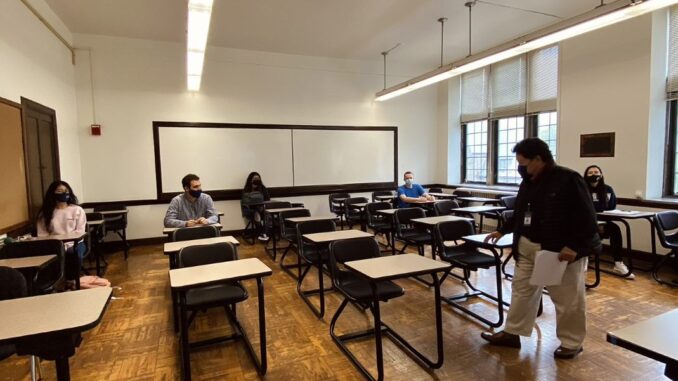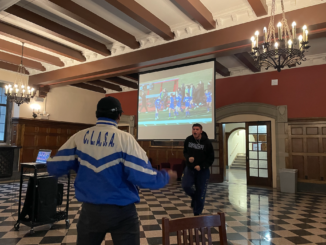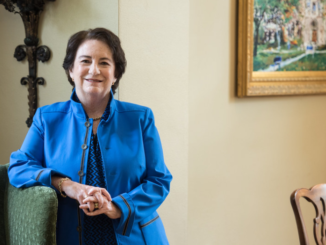
Emily Ford
Contributing Writer
Opening the door slowly with open arms, Luis Argueta opened the door to his office with a welcoming wave to “come on in.” As he sat down and wrapped up an email on his computer screen, he began to speak in a soft yet assertive voice with his full attention genuinely devoted to what was next to tackle.
The renowned filmmaker of over 40 years began to open up and tell his story.
Most mornings you can find him walking to campus with his good friend and colleague, Professor Douglas Keberlein-Gutierrez, to begin the days teaching and contributing to the community here at Dominican University. Dominican, in fact, is one of the main reasons why Argueta is here in the country in the first place, in the midst of the COVID-19 pandemic. It is especially the university’s “young energy” that attracted him here, he said.
“I feel so privileged to be at Dominican University, especially at a time with such imbalance in the country,” he said. Argueta is here as the Lund-Gill Chair, a program that is funded by donations to bring renowned figures to Dominican as visiting professor for a semester.
Another big reason why Argueta is in the Lund-Gill program this semester is because of Keberlein-Gutierrez, who put Argueta’s name forward to call attention to what he has to offer the university.
“Professor Argueta had visited campus in the past to screen his documentaries,” said Keberlein-Gutierrez. “They were received very well as the content hit home for many students since immigration has been a hardship for many families and Professor Argueta studies this from many different angles.”
Argueta eased into conversation about his teachings and life experiences in his career by starting off with a challenge.
“I hope that if I leave anything with students it’s that we need to question the things we think about,” he said. “We live in one little world. Actions have reactions in the long run.
“Storytelling is so important because when it is genuine, it is nothing close to a lie, a rumor or misinformation,” he said. Argueta encouraged students to embrace this idea because being humble and simply telling his story are big aspects of his course and has further allowed him to be where he is today.
However, Argueta didn’t always have it out to be a college professor or even a world-renowned film director and producer. Much like film producing is a process, his life journey has certainly been a process, one that has helped him find his voice in the things that matter most to him and now he is humbly passing this on to students here at Dominican University.
From Engineer to Film Producer
As a young man in the 1970s, Argueta traveled from Guatemala to the University of Michigan to study engineering.
“My parents were traditional in the sense where back in the day, when you chose a career, you could really only pick from three things: become a doctor, become a lawyer or become an engineer,” he said.
Engineering might have been his major, but film was his passion.
“I’ve always had a love for film,” he said. “I would skip school on Wednesdays as a kid and go to the theater to watch movies. Pretty sure I went to the theater more than I went to church back then.”
During his time in college Argueta joined film groups to begin pursuing his interest in film. Later he took a film course outside of the university and finally had the realization that filmmaking is a craft that requires commitment and a vision.
It was an epiphany for him.
“I was taught never to speak out or break my silence, but film has helped me express myself and find a way around that silence,” he said.
Much of that expression has been about Guatemalan politics and history, and the struggle of regular people in their search for peace.
In history, Guatemala struggled with political and social turmoil for decades after there was a U.S.-sponsored overthrow of the democratically elected government in 1954 known as the Guatemalan coup d’état.
He recalls the spark that led to his first documentary film “The Cost of Cotton (El Costo Del Algodon)” in 1977. It was inspired directly from the front page of the New York Times about a DDT pesticide contamination in the water in Latin America that directly affected Guatemalans and the neighboring countries.
Cattle and fish were dying, and children and workers in the fields were getting sick. From this issue Argueta decided to create a visual piece to help show how the workers in Guatemala were being affected. But the Guatemalan government saw that film as a threat to its authority.
Understanding this risk, however, Argueta continued to release the film and was censored by authorities resulting in him unable to travel back to Guatemala for some time. Now, reflecting on that experience from his office at Dominican 45 years later, he says, “‘The Cost of Cotton’ wasn’t out to prove anything, I just wanted to tell a story of these people and their hardships.”
He couldn’t go back to Guatemala, so he turned to commercial filmmaking. He founded Morningside Movies in 1988, which specialized in television commercial work that catered mostly to Spanish-speaking countries.
Later, finding the inspiration to make another film, Argueta created perhaps one of his most influential pieces to date, El Silencio de Neto in 1994. This film was submitted to the Oscars and has been featured at film festivals around the world.
It is clear that it holds a special place in his heart as well.
“In that movie you can actually hear the voice of my spiritual brother who I lost many years ago when I was young,” he said.
Argueta described the film as a coming-of-age movie about a boy who witnesses the political turmoil in Guatemala during the 1950s. The uncle in the movie teaches his nephew, the main character, about certain evils that proliferated at that time.
“It was certainly a challenge because I wanted it to be perceived in a certain way,” said Argueta. “It was the way me and my generation grew up in Guatemala, but I didn’t realize it would have such a ripple effect.”
The effect and silencing that he experienced in his country is the link to what inspired him to create meaningful documentaries and a coming-of-age film that continues to be shown around the world at prestigious film festivals. Nearly 30 years later, he still regularly hears from filmmakers who were inspired by this movie.
Argueta is out to inspire his students that they too can break their silence through their own version of storytelling. “I would like to be the beneficiary of this young energy here, that was a big attraction for me.”
His most recent work that also made a large impact on its audience was the 2010 documentary film “AbUSed: The Postville Raid” about a massive immigrant raid of workers who were either immigrants or undocumented in Postville, Iowa, that were made up largely of Guatemalan descent.
It speaks to human mobility and the lack of privilege that comes with being an undocumented or immigrant worker in this country right now, he said.
He is also now working on the fourth part of an immigration series, “Ausencia,” which mainly focuses on women who live in the Guatemalan Highlands and the hardship they face in their lives. Through the film’s website, people are also able to make a tax-deductible donation to help with the production of the movie.
Continuously striving to help the world understand what it means to break the silence, Argueta focuses on the things that matter to us. “We live in one little world, actions have reactions, and by learning to break our silence, we could help other find their voices, too,” he said.
“We live in one little world, actions have reactions, and by learning to break our silence, we could help other find their voices, too,” he said.



